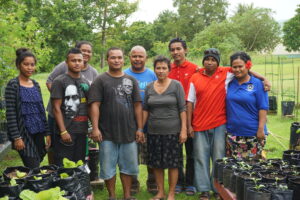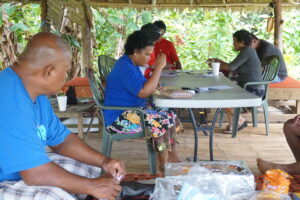Final report for MW17-005
Project Information
The College of Micronesia (COM) serves 3 nations and 6 island groups over an area larger than the continental United States, with 1 Sustainable Agriculture, Research, and Education (SARE) Coordinator. There are significant geographic barriers in promoting and coordinating SARE activities in the islands. Both the University of Guam (UOG) and COM SARE Coordinators are nearing retirement.
There is a crucial need to build a network of trained Sustainable Agriculture professionals across these islands in the region, with a peer to peer communications network, on island sustainable agriculture issues. In the trainings, a goal of increasing WSARE grant applications and educational materials usage on the islands was addressed.
This multi-institution, multi-state project between UOG and COM aimed to recruit, train and support a network of agricultural professionals from seven islands to increase their expertise in sustainable agriculture. Participating islands included Guam, Pohnpei, Chuuk, Kosrae, Yap, and Marshall Islands. Project Co-investigators identified associate coordinators for Guam and Pohnpei and recruited island WSARE liaisons with assistance of Extension Directors from Chuuk, Kosrae, Yap, and Marshall Islands.
On-island tasks were required (conference calls, online training, ag professional survey) building up to to the selection of one or more representatives that attended a one-week Sustainable Agriculture Liaison’s Conference on Guam. Key topics included; WSARE grants, sustainable agriculture principles and practices, UOG-SARE curriculum, and national online resources. Liaisons' post conference support included seed money for on island demonstrations, monthly conference calls, and coaching in developing a WSARE grant for each island.
Objective 1: Recruit potential candidates from a pool of agricultural professionals from Guam, Pohnpei, Chuuk, Kosrae, Yap, Marshall Islands, and Palau to become Co-coordinator or WSARE liaisons.
Upon initiation of the project, Land Grant staff and agricultural professionals across the region were notified of the project. Interested participants with approval from Extension Directors completed the online SARE National Continuing Education Course 1, Sustainable Agriculture: Basic Principles and Concept Overview at: http://courses.sare.org/c1_1_1.htm. Course 3: Agricultural Ecosystem Management will also be utilized in the program trainings. From those completing the online course, one from each island was selected to conduct an island agricultural professional survey, similar to the island assessments conducted for the 2007 WSARE Sub-regional conference held on Guam, prior to attending the Guam Liaisons’ conference. Unfortunately we were not able to recruit a partner from Palau. The liaisons were supported in these survey efforts through regular teleconferences.
Early 2019, we were informed that in the months following the Guam conference, the Kosrae liaison resigned from his Land Grant job and the project. So, the project investigators worked on recruiting and meeting with alternate agriculture professionals to continue the project activities. Extra online sessions were held to help them come up to speed. Communications with and recruitment of a CNMI WSARE coordinator was done during as part of these communications. At this time the team worked on expanding membership to include additional land grant professionals to plan for the submitted coordinators grant "Eight Islands, Twelve Trainings", WSARE summer meeting in Micronesia, WSARE funded demonstrations, and October-December WSARE grant submissions.
Objective 2: Train WSARE liaisons to increase their knowledge in sustainable agriculture and the WSARE program.
When on-island tasks were completed by the island representatives, a one-week Sustainable Agriculture Coordinator’s Conference was held on Guam, in September 2018. Key topics included; WSARE grants, sustainable agriculture principles/practices, and national SARE Continuing Education Program course (Modules 1 & 2), other SARE online resources, ATTRA resources, and SARE curriculum developed by UOG. The UOG-SARE curriculum consists of a range of New Farm subjects such as farm planning, agroforestry and sloping land agriculture, permaculture, organic agriculture principals, soil and water conservation, plant propagation and small scale fruit and vegetable nurseries, irrigation and water management, chicken tractors, small-scale poultry production, mulching and sheet mulching, raised beds, container gardening, composting, fruit tree windbreaks, and others topics of participants interests. Liaisons were also taken on field visits/farm tours of past and recently funded SARE grants.
2019 January to May: Online Zoom trainings and several meetings were conducted during the first quarter of the year in preparation for the coordinator's meeting, start developing plans for site demonstrations, begin demonstrations on several of the islands, and recruit for the upcoming regional new PDP Enhanced Coordinator's grant.
Objective 3: Build and operate a one-year peer-to-peer communications network of newly trained WSARE liaisons with a focus on island sustainable agriculture issues.
Since February of 2018 weekly liaison conference calls were held to coach the participants through these tasks through September 2018 highlighting the islands’ program activities. Following the Guam training the Zoom was used to prepare the 2nd Enhanced Coordinators grant to meet the participants' request.
2019: Liaison network continued to operate utilizing Zoom as the online platform in addition to regular emails. Each island liaison understands and can utilizing the platform. We now have an effective method of communications in our region. Coordinator's and liaisons were key in identifying educational needs for 2019 WSARE regional outreach activities for the Island WSARE visits in May of 2019.
Objective 4: Increase WSARE awareness, grant applications, and use of SARE resources in the Western Pacific.
Upon returning to their islands, each liaison met with agriculture professionals and producers in a WSARE grant promotion meeting. Several formed local grant teams to write a professional producer grant. All worked on establish a sustainable agriculture demonstrations during 2019. Following the WSARE PDP Conference in Guam $2,000 seed money subcontracts for each island ($12,000) was issued to COM FSM office for disbursement to the WSARE liaisons. This was to implement a WSARE demonstration site in their island. Upon completion and approval of the subcontract application, participants received an initial $1,000 for the demonstration implementation and the final $1,000 on completion of the site demonstration. COM FSM handled oversight of the demonstration projects. The WSARE demonstration is a site tool in WSARE outreach for the each island.
2019: After the Guam portion of the coordinator's meeting, WSARE State PDP Coordinators and WSARE staff conducted grant writing workshops in the region. During the period of July to November 2019, several grant writing group and one-to-one ZOOM meetings and consultations were held to assist the liaisons and other land grant professionals in WSRE grant submissions.
Education
Guam WSARE team led the island liaisons and associate coordinators in weekly online learning circles where prior to each online meeting participants viewed/read/explored the assigned sections of the online SARE National Continuing Education Course 1, Sustainable Agriculture: Basic Principles and Concept Overview at: http://courses.sare.org/c1_1_1.htm. Then sessions were held on conducting focus groups using an extension publication from University of Florida Extension on conducting focus groups as the required reading. Then the SARE National Continuing Education Course 2: Strategic Farm/Ranch Business and Marketing. In each session the on-line group discussed the concepts and identified local examples and regional projects illustrating key topics. Common related issues and interests surrounding the topics were identified. Participants also completed supplemental assignments exploring relevant online information resources and identified related local issues.
In July 2018 online session covered: conducting focus groups and using focus groups in needs assessment; and writing WSARE grants to address identified needs. This was to guide a process where each island team conducted two focus groups (one of the agriculture professional support community and one of local producers) to identify issues impacting the long term sustainability of agriculture on each island. Funds were sent to each island to support materials and supplies for each focus group.
Once the needs assessments were completed in August 2018 the liaisons gathered in Guam for a one week training in September 2018 that will involved hands on workshops in various sustainable agriculture practices for our tropical island production systems (both subsistence and commercial), basic budgeting and hands on WSARE grant writing.
Following the training each participant prepared a plan to set up a teaching demonstration, for use in conducting similar workshops, on their island and support in submitting their WSARE grant. Funds for these projects were made available to COM FSM during the 2019 year.
Education & Outreach Initiatives
Through online learning circles familiarize island WSARE liaisons in the principles and practices of sustainable agriculture and expose them to local examples and applications.
The the online SARE National Continuing Education Course 1, Sustainable Agriculture: Basic Principles and Concept Overview at: http://courses.sare.org/c1_1_1.htm, also course 2: Strategic Farm/Ranch Planning and Marketing were utilized as a starting point and links to island examples and publications were examined. In the process the participants were exposed/introduced to the breadth of topics discussed under the SARE program over the past 3 decades and acquired a familiarity with some of the available online learning and extension resources. We also conducted hands on grant writing sessions using past successful and unsuccessful local grant applications. During these sessions we stressed using their own agriculture professional and producer needs assessment to justify grants for their island.
Outcome:
The participants have a better understanding of the SARE goals, objectives and past activities. This knowledge increases the groups effectiveness in identifying appropriate issues, partners and methods to tap in writing fundable WSARE grants. The participants are more confident in their own ability to submit a WSARE grant.
Impact:
An increase in WSARE submissions from these isolated islands. An unanticipated outcome was these participants were better prepared to host the WSARE visiting teams in May of 2019 both in terms of recruiting participants, site preparation and knowledge of island issues.
Each participant will learn multiple ways to incorporate soil and water conservation practices and commercial crops into tradition island agroforestry subsistence systems and methods of entering local markets.
Participants will establish demonstrations on some of the topics on return to their island.
In the Guam training participants received hands on training implementing conversation practices and integrating cash crops within an agroforestry system. They received training in direct market alternatives (roadside stands, farmers markets, and selling to restaurants) appropriate for their islands.
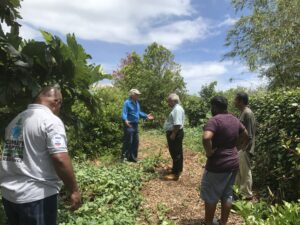
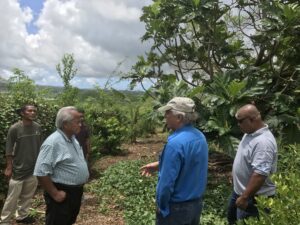
Outcome:
Participants' knowledge of soil and water conservation practices increased an most applied this new knowledge in setting up a demonstration on their home island.
Participants' confidence in their ability to set up a demonstration of these practices in a forest garden increased, and the island demonstrations are a visible outcome.
Participants' knowledge on production of several cash crops and seed plant material sources increased. This allowed several of them to articulate their plant materials needs to the WSARE PDP Coordinators and Administrative Council and staff.
Impact:
New teaching demonstrations were implemented on each island. This serves as a visible reminder of the WSARE visits.
Longer term; increased planting of cash crops in tradition subsistence agroforestry plots and increased use of soil and water conservation practice by both subsistence and commercial producers should be observed in future years.
1. In July 2018 conduct online learning circles on needs assessment, hosting focus groups and writing WSARE grants. The liaisons then conduct needs assessment focus groups (ag. professionals and producers) on their islands.
2. In the Guam training the output of the island focus groups were reviewed to:
a. identify commonalities across the islands and
b. each participant will identify an issue to write a WSARE grant to address
3. As a group go through the Professional Producer grant RFP with a focus on the local issues identified.
In two of the regular Tuesday morning liaison online learning circles participants went through Guam's regular WSARE grant writing workshop prior to training on needs assessment and focus groups.
In July and August 2018 a series of online meetings covered conducting focus groups and coached the participants through their own process.
Homework from this was for each liaison to conduct a focus group among agricultural professionals and one among island producers. In each they documented the participants input onto flip charts.
These materials were brought to Guam and used in the Guam training's regional planning and grant writing sessions.
The Guam WSARE team worked with the participants in drafting a grant proposal for each participant's island.
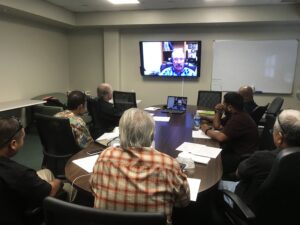
WSARE liaisons in a teleconference with Jim Freeburn and Al Kurki.
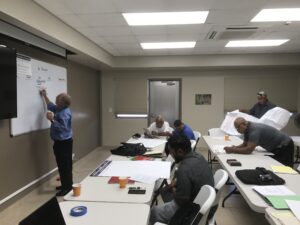
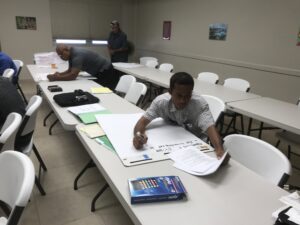
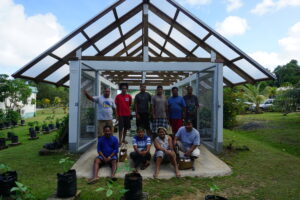
Outcomes:
Participants have a broader knowledge of the issues impacting sustainability of agriculture on their islands both from the agriculture professional and farmer perspectives
They also have a broader knowledge of the goal and priorities of the WSARE program and the roles of WSARE grants.
Participants have increased confidence in their ability to write WSARE grants one half of the participants submitted WSARE grants in 2019. Others started but did not submit.
Impacts:
More WSARE grants were submitted from these remote islands.
Educational & Outreach Activities
Participation Summary:
Learning Outcomes
Project Outcomes
Face of SARE
During this reporting period Guam WSARE coordinator and associate coordinator regularly promoted the WSARE grant programs to the local farmer organizations (Farmers Cooperative Association of Guam, Northern and Southern Soil and Water Conservation Districts), as well held an advisory group meeting to identify priorities. WSARE sponsored on UOG campus demonstration has been used in a large number of UOG agriculture classes and farmer workshops.
